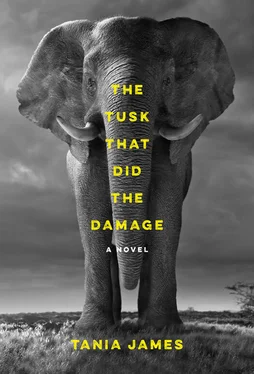Officer Vasu led the tour. Here were the mosquito nets rolled up over the cots; here were the beige shirts hanging from the wall pegs, the bullet shells on the bed, the walkie-talkies spitting sounds, the calendar on the wall with a young girl shyly fondling her braid. And here was the small shrine by the doorway, on a shelf nailed to the wall, with propped pictures of Ganesh and a blue cherubic Krishna, boxes of incense and burnt matches planted in balls of wax. Here they prayed before entering the forest.
As we filmed, it came out that Officer Vasu was from a poor family, same as Officer Soman, who saw his own family once a month. Officer Vasu pulled out a wafer-thin wallet, and from it he extracted what seemed to be a single puzzle piece.
“Me,” he said.
And it was him, albeit a younger him, trim and proud in his beige uniform, his foot hitched on the bumper of a jeep. He had cut around his own shape and that of the jeep attached to his foot, as if they were one. I pulled focus on the photo, held delicately in his fingers, dirt under the nails. There was something so humble, so heartwarming, about both Vasus, large and small, now and then, neither of whom seemed capable of harm. Yet two days later, Officer Vasu would shoot a poacher dead. At first I wouldn’t believe it; the shooter had to be some other Vasu, not our Vasu, not Vasu of the clown-sized camo shoes. Even in the space of a few hours, I thought I’d come to know him. Had he been playing to the camera? Or had I cast him as the sweet, clumsy native before he’d even opened his mouth?
The jeep trundled us homeward in the late afternoon. The moon made an early cameo, a translucent scoop of vanilla melting into the blue. Ravi had mellowed toward me, and riding beside him, I almost forgot about Teddy in the backseat, wearing that sated look he always got at the end of a good day. Ravi steered with one hand, pointing out the cotton silk trees, the sals, the white pines, and the occasional aanjili, guarded by thuggish monkeys.
We came to idle behind an open lorry, four boys crammed in the back, heels bopping against the bumper. Three of them were chatting; the fourth was distracted by a silky seed floating past. I thought of that Helen Levitt photograph: four girls walking down a street, distracted by passing soap bubbles. Helen Levitt had been twenty-five, around my age, when she bought a Leica. She fit a winkelsucher to her camera, a device that let her point herself in one direction while the photo snapped from the side, so the subject was oblivious to being photographed.
I have almost no photos of our time in India. I told myself I didn’t want to be that tourist, snapping exotica for the benefit of friends back home, who’d get bored after flipping through a dozen or so. Teddy and I saw our India only in terms of the film, admittedly a narrow lens. We made up for our insecurities by being dogged in purpose: to get everything we could, and get it right.
And yet there were unexpected moments I still wish I could have captured somehow, in a medium more lasting than memory. Like the boy in the lorry, reaching for the silk seed. Or Ravi reaching over the gearshift and squeezing my hand, before Teddy could see.
For dinner, Ravi took us to his favorite restaurant, Y2K, a cryptic name belied by perky flower settings and plastic gingham tablecloths. Our server brought three “home-style meals”—a hillock of rice accessorized with various stews and curries — and diplomatically set spoons beside two of the plates. Ravi ate with nimble fingers that never seemed to still, always tossing or crushing or rounding up a bite, leaving little room for talk.
We were halfway into the meal when Teddy said, “Okay, Em, fess up.” My stomach dropped, knowing where he was headed. I’d forgotten to warn him, neglected to explain. Now my signals — beseeching eyes, rigid head shake — were all too late. “Where’d you get that stuff about Shankar Timber?”
Ravi’s head snapped up.
Slowly I spooned more pickle onto my plate. “I don’t remember.”
“You asked her about Shankar Timber?” Ravi said.
Teddy turned to Ravi. “Have you heard about this? There’s a village called, what was it—”
“Manaloor,” Ravi said.
“Right. Anyway, the discussion got pretty tense, but Emma didn’t back down. She’s an excellent interviewer, way better than me.”
I shook my head at Teddy. “He doesn’t wanna hear this.”
“What makes her so excellent?” Ravi asked. A brittle note had entered his voice.
“Well, generally speaking, people tend to spill their guts around her.”
“Jesus, Teddy, you’re making me sound like an operator.”
“She’s a master of the pregnant pause, for example. People always feel the need to fill a silence, so they end up saying more than they mean to. And there’s this other tactic: at the end of an interview, she usually goes, Is there anything else you think I should know? ”
“It’s an honest question,” I said.
“It’s all in the tone — like, Hey, you can trust me. But also, I know there’s something you’re not telling me. ”
“So she manipulates people,” Ravi said.
Teddy shrugged. “All film is manipulated to some degree. It’s a way of cutting closer to the truth.”
“Yes, well. Too close and you get a girl cutting her wrists.”
Teddy’s spoon hung in the air for a moment, before lowering to the table. He looked at me, then Ravi. The silence was a vise, tightening with every second.
“I’m done,” Teddy said, tossing his spoon on the plate, and left to wait in the car.
I shook my head at Ravi.
“What?” he demanded.
“I can’t believe you.”
“I can’t believe you. ”
“I’m sorry …”
Ravi rose.
“I didn’t tell Samina you told me.”
He waved me off and left to rinse his hand at the sink.
I’d been on a string of endless plane trips and car rides, but no voyage had ever felt as long as the thirty minutes it took to get home. I kept glancing at Teddy in the rearview, thinking that if I could just catch his eye, we’d be all right. But Teddy was turned toward the window, his blind gaze fixed on nothing.
We drove Leela to the hospital in Synthetic Achan’s car. On the way she began to bleed. She braced her arm against the car door, her face flushed and ugly with pain. My mother gripped her hand. Jayan hugged the wheel.
A hemorrhage, the doctor called it. She had bled out nearly a quarter of her womb’s supply. The baby was alive, but there was a high chance that in two weeks’ time she would deliver a thing too small to survive. Even if the baby lived, he would be too soft in the head to know his father from a fence post.
They fed tubes into Leela’s arms and kept her for the night. In the waiting area I watched Jayan run his thumb along the edge of the car key, up and down and up and down, his face betraying no feeling. At some point he went in to see her alone. He emerged even more sunken than before and said she wanted her underthings and toothbrush.
Leaving Leela with my mother, I drove through the murky dawn. Jayan sat very still in the passenger seat. I was dazed with fatigue, but his murmur roused me instantly.
“I should have killed that elephant. I should have killed him when you came and asked me.”
“I was asking you to find someone else—”
“It thinks it can trample my farm and family, end my life as easily as snipping a thread …”
“It’s an animal. I doubt it has a strategy.”
“Then you don’t know a thing about elephants.”
“But what will Leela say?”
He turned a fierce eye on me. “Who will tell her?”
We passed empty houses painted in the color of cake icings, a church helmed by a huge neon lady sprinkling lights from her fingers. This was the Virgin Mother, whose picture Leela kept in her mirror, a white woman with eyes glassy and mournful for her son.
Читать дальше












